- Home
- »
- Healthcare IT
- »
-
Clinical Decision Support Systems Market Size Report, 2030GVR Report cover
![Clinical Decision Support Systems Market Size, Share & Trends Report]()
Clinical Decision Support Systems Market (2025 - 2030) Size, Share & Trends Analysis Report By Product (Standalone CDSS, Integrated EHR with CDSS), By Application (Drug-Drug Interactions), By Delivery Mode, By Component, By Region, And Segment Forecasts
- Report ID: GVR-2-68038-339-3
- Number of Report Pages: 135
- Format: PDF
- Historical Range: 2018 - 2024
- Forecast Period: 2025 - 2030
- Industry: Healthcare
- Report Summary
- Table of Contents
- Segmentation
- Methodology
- Download FREE Sample
-
Download Sample Report
Clinical Decision Support Systems Market Summary
The global clinical decision support systems market size was estimated at USD 5.79 billion in 2024 and is anticipated to reach USD 10.71 billion by 2030, growing at a CAGR of 11.0% from 2025 to 2030. Clinical decision support systems (CDSSs) have experienced significant advancement in recent decades, providing clinicians with vital tools to make informed decisions in patient care.
Key Market Trends & Insights
- North America clinical decision support systems market dominated the global market with over 43.10% revenue share in 2024.
- CDSS market in the U.S. held the largest market share in 2024.
- By delivery mode, on-premise segment in delivery mode dominated the market with the largest share of 41.9% in 2024.
- By component, CDSS services held the largest market share of 42.3% in 2024.
- By product, standalone CDSS held the largest market share of 30.7% in 2024.
Market Size & Forecast
- 2024 Market Size: USD 5.79 Billion
- 2030 Projected Market Size: USD 10.71 Billion
- CAGR (2025-2030): 11.0%
- North America: Largest market in 2024
- Asia Pacific: Fastest growing market
These systems have emerged as a promising means to improve patient outcomes and reduce overall healthcare costs. AI and ML technologies are transforming the CDSS market, offering advanced functionalities such as predictive analytics, pattern recognition, and tailored recommendations. AI-driven CDSSs can analyze extensive datasets, detect patterns, anticipate outcomes, and suggest optimal treatment strategies. Researchers are integrating AI with CDSS, as demonstrated by the University of Texas at Austin’s Dell Medical School researchers who developed an AI-based CDSS to aid clinicians in discussing nutrition and making decisions with patients about diet improvements in December 2022.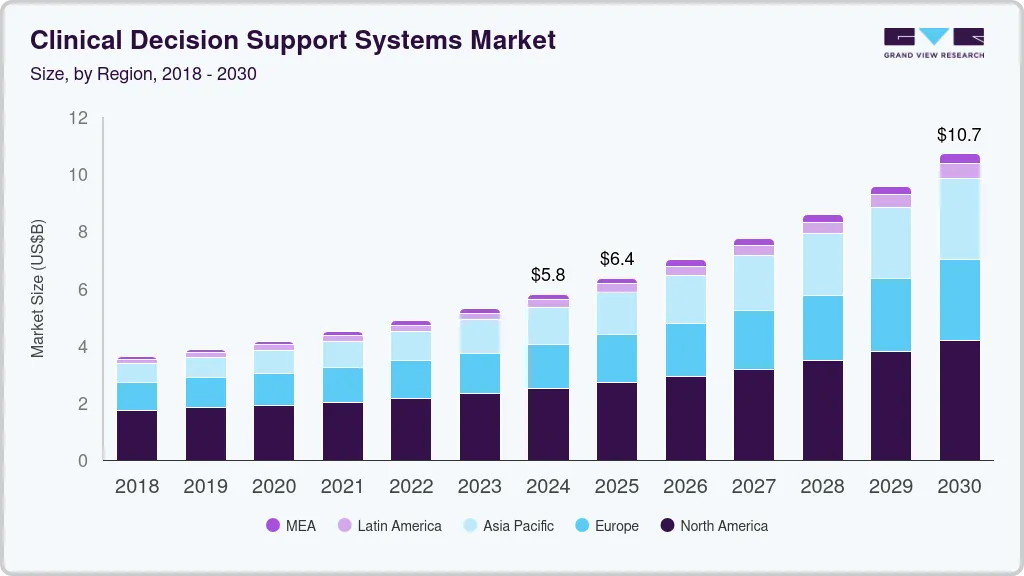
The adoption of personalized medicine is increasing, with CDSSs playing a crucial role. These systems analyze patient data, including genetic profiles and medical histories, to customize individual treatment plans. By providing tailored recommendations, CDSSs enhance treatment effectiveness and reduce the risk of adverse reactions, driving market growth.
Governments worldwide are implementing regulations and incentives to promote CDSS and other healthcare IT solutions. These regulations focus on enhancing patient safety, interoperability, and care quality, prompting healthcare organizations to invest in CDSS to comply with regulatory requirements and qualify for incentives.
The COVID-19 pandemic has also positively impacted the market growth, leading to increased adoption of CDSS. CDSSs have been instrumental in supporting patient resources and services, as demonstrated by their role in real-time clinical diagnosis of COVID-19 and patient triage. Various countries offering online services have further fueled market growth. Market players have introduced CDSSs for managing COVID-19 data and insights. For instance, in May 2022, Epocrates launched an innovative tool for long COVID-19, integrating the latest updates to expand the collection of clinical decision support guidelines. Consequently, the increased adoption and introduction of clinical decision support systems have propelled market growth during the pandemic.
AI-Driven Clinical Decision Support Systems Market
Researchers are integrating AI into Clinical Decision Support Systems (CDSS) to process vast data to recommend treatment strategies, highlight potential issues, streamline operations, and support healthcare professionals. Hence, researchers are integrating CDSS with AI. For instance, in December 2022, the University of Texas at Austin’s Dell Medical School researchers designed an AI-based CDSS to assist clinicians in discussing nutrition and sharing decision-making with patients about diet improvements.
By utilizing patient health data, including information from electronic health records (EHRs), AI-driven clinical decision support systems enhance the accuracy of diagnoses, treatments, and prognoses for specific medical conditions. These systems predict medical outcomes or assess disease risks based on biomedical imaging data. AI CDSS can analyze historical, current, and new patient data to identify safety concerns, errors, or opportunities for enhancing care pathways. Their precise predictive capabilities open up innovative avenues for optimizing patient care.
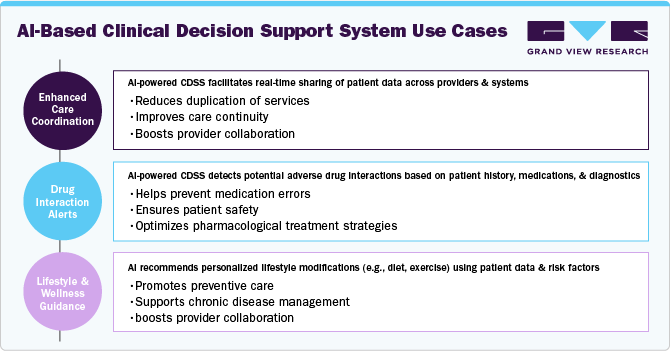
Case Study and Survey Insights
The Rising Role of CDSS in U.S. Healthcare
In June 2023, Ascom conducted a nationwide survey (via OnePoll) of 950 U.S. nurses in general care and ICU settings to assess the usage, impact, and perception of Clinical Decision-Support Systems (CDSS).
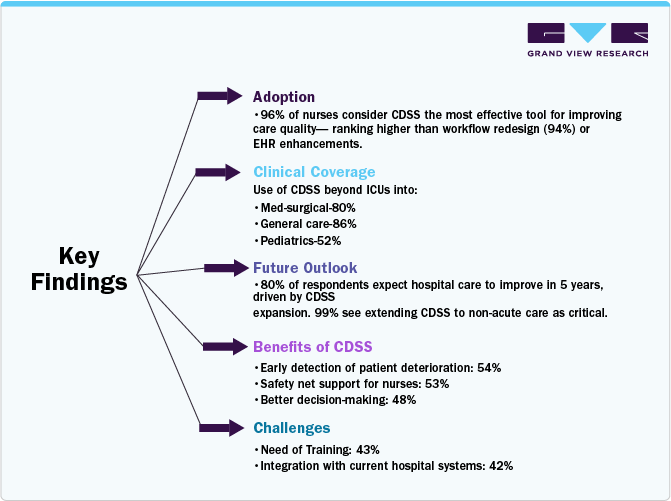
“Analyst Takeaways: The Ascom CDSS Report 2023 highlights growing confidence in clinical decision support systems, with 96% of nurses ranking it as the top tool for improving care. Its expanding use beyond ICUs shows market maturity, but challenges like integration and training remain. The shift toward real-time, mobile “push” alerts reflects a broader move to intelligent, proactive care-creating clear opportunities for agile, user-friendly CDSS platforms.”
Market Concentration & Characteristics
The degree of innovation in the clinical decision support systems industry is high. This innovation encompasses the integration of advanced technologies like artificial intelligence (AI) and machine learning (ML), along with frequent updates to features aimed at enhancing operational efficiency. For instance, in November 2023, GE HealthCare launched AI models to predict patient response to immunotherapies. These models are expected to be used in clinical decision support and pharmaceutical drug development.
The level of M&A activities is high in the market. The market players undertake several initiatives such as mergers & acquisitions, partnerships, and product launches to strengthen their product portfolio, ultimately contributing to the market growth. For instance, in October 2022, Beckman Coulter Diagnostics acquired StoCastic, LLC., a company that offers decision support based on evidence to hospital emergency departments (ED). The acquisition is expected to strengthen Beckman Coulter Diagnostics' CDSS portfolio.
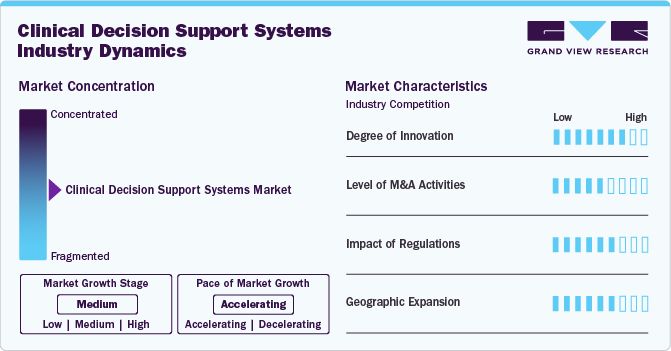
Regulatory bodies, such as the FDA, regulate the CDSS industry. For instance, in September 2022, the U.S. FDA released finalized and revised guidance documents, such as Final CDS Guidance, addressing clinical decision support software and various digital health subjects.
Major players are focusing on geographical expansion to capture new geographical CDSS industries. The expansion is generally done by launching manufacturing facilities or R&D centers in new locations or mergers and acquisitions of companies based in different countries.
Product Insights
Standalone CDSS held the largest market share of 30.7% in 2024, because it is widely adopted for its low cost and simplicity. They don't require standardization or extensive clinical expertise and can operate without real patient data. Their user-friendly nature contributes to dominance in hospitals and clinical settings.
The integrated EHR with CDSS segment is expected to grow at the fastest CAGR during the forecast period, driven by increasing EHR adoption in multi-specialty healthcare facilities. Integrated systems provide CDSSs access to patient databases and medical histories, automating clinical workflows. In April 2023, the U.S. government proposed a rule granting providers more comprehensive access to information within their EHR systems to evaluate CDSS algorithms and outcomes. Integration of CDSSs with EHRs standardizes workflows and leverages existing datasets. In addition, more CDSS functions are built into EHR systems, supporting segment growth.
Application Insights
Drug allergy alerts accounted for the largest market share of 25.7% in 2024. Several people have allergies to specific drugs, so it is important to have systems that provide allergy alerts. because it is widely utilized in clinical decision support systems (CDSSs) to enhance patient safety and prevent adverse drug reactions (ADRs). CDSSs allow customization of alerts based on individual patient profiles and specific allergy information. Healthcare providers can tailor alert thresholds and preferences to ensure relevance and actionability for each patient. The rising burden of drug allergies is driving CDSS adoption, fueling segment growth. For example, approximately 10% of the U.S. population is allergic to penicillin, according to the CDC.
The clinical guidelines segment is expected to grow at the fastest CAGR during the forecast period. Clinical Decision Support (CDS) systems provide guidelines for diagnosis and treatment, delivering essential real-time information primarily at the point of care. These systems automate routine tasks, alert clinical teams to potential issues, and provide recommendations for assessing healthcare professionals and patients. For instance, the American Medical Informatics Association (AMIA) defines Clinical Decision Support as a mechanism to enhance health-related decision-making and actions, empowering clinicians, patients, and stakeholders to refine clinical decision-making processes and improve healthcare service quality and patient outcomes.
Component Insights
CDSS services held the largest market share of 42.3% in 2024, as it offers implementation, training, support, customization, and consulting services to help healthcare organizations maximize the value of CDSS software and optimize clinical decision-making. This segment dominated the market as continuous technical support ensures CDSS functionality and performance. In addition, healthcare professionals require training to effectively utilize CDSS, further propelling segment growth.
CDSS software segment is anticipated to grow at the fastest CAGR during the forecast period. The CDSS software, when integrated with software for CPOE and EHRs, provides enhanced decision support by making customized and specific results for the particular patient. Novel innovations for technical support, interoperability of the software, and efficient outcomes are anticipated to drive the market during the projection years. For instance, in July 2022, QIAGEN announced that its CDS software platform, QIAGEN Clinical Insights (QCI), was utilized to analyze over three million patient molecular profiles for oncological and hereditary diseases.
Delivery Mode Insights
On-premise segment in delivery mode dominated the market with the largest share of 41.9% in 2024. On-premise CDSS solutions offer flexibility for customization and integration with existing healthcare systems and workflows, catering to specific organizational needs. Multispecialty hospitals and large healthcare organizations prefer this system for greater data control within their infrastructure. Integrating existing systems like EHRs enables smoother data flow and interoperability, enhancing efficiency in decision support.
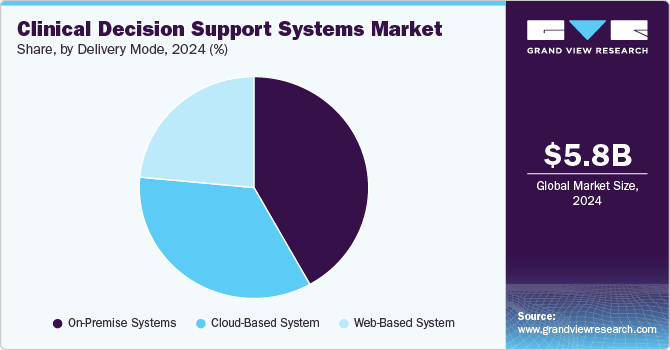
Cloud-based systems are expected to grow at the fastest CAGR over the forecast period. Representing a significant IT advancement, they offer reliability and cost-effectiveness. Enhanced accessibility via mobile platforms and robust data protection mechanisms drives their adoption. Unlike web-based systems, cloud solutions are not dependent on web browsers, enhancing security and usability.
Regional Insights
North America clinical decision support systems market dominated the global market with over 43.10% revenue share in 2024.This dominance is fueled by the rising demand for IT solutions in healthcare and the emphasis on delivering quality healthcare services. Rapid technological advancements further drive market growth. Initiatives promoting CDSS adoption, like EBSCO Information Services' Dyna Innovation Center launch in December 2023, contribute to regional market expansion. For instance, in December 2023, EBSCO Information Services launched Dyna Innovation Center in the U.S. to promote innovation in clinical decisions. Hence, such initiatives from the market players are expected to contribute to the region's CDSS market growth.

U.S. Clinical Decision Support Systems Market Trends
CDSS market in the U.S. held the largest market share in 2024. The growth is driven by the increasing adoption of EHRs by hospitals and healthcare institutes. For instance, according to the Office of the National Coordinator for Health Information Technology, in 2021, approximately 78% of physicians and 96% of hospitals used a certified EHR.
Europe Clinical Decision Support Systems Market Trends
CDSS market in Europe is expected to maintain a substantial market share over the forecast period. The growth is due to the presence of key market players, increasing adoption of CDSS, and supporting frameworks. For instance, in February 2024, the European Commission released a document to emphasize and promote the usage of clinical decision support tools.
Clinical decision support systems market in the UK is expected to grow significantly due to the increasing adoption of advanced healthcare IT solutions. Similarly, well-collaborations strategies between healthcare and IT industries in the UK and government initiatives, is expected to propel the country’s market growth. For instance, in June 2023, the UK government announced approximately USD 22.7 million in funding to deploy AI-based decision support tools for early diagnosis of strokes, cancers, and heart conditions.
Asia Pacific Clinical Decision Support Systems Market Trends
CDSS market in Asia Pacific is expected to grow at the fastest CAGR during the forecast period. The growth can be attributed to the increasing healthcare sector investments in countries such as China, Japan, India, and Australia. Asia Pacific’s market is showing high potential due to growing R&D expenses by governments of key regional economies for improving information technology penetration in the healthcare sector. Some of the major players in this market are MedPac Systems Solutions India LLP, Allscripts Healthcare Solutions, Inc., Practo, Cerner Corp., and Koninklijke Philips N.V.
Clinical decision support systems market in Australia is majorly driven by the increasing adoption and promotion of CDSS, especially by government bodies. For instance, in April 2022, Northern Territory (NT) Health partnered with Alcidion to get access to the advanced Miya Precision CDS platform. NT Health will use the CDS platform in its five public hospitals and remote and community health centers serving more than 200,000 people. The CDS platform was expected to support the network's bed and patient flow management across NT hospitals and satellite centers.
China clinical decision support systems market is expected to grow at a significant CAGR owing to numerous business initiatives undertaken by the market players. For instance, in June 2023, AffaMed Therapeutics launched Headache CDSS in partner with the International Headache Center of the Chinese PLA General Hospital at the 16th Annual Meeting of Neurologists of the Chinese Medical Association.
Key Clinical Decision Support Systems Company Insights
The global CDSS market is fairly competitive. The most notable participants in the market are McKesson Corporation; Philips Healthcare; Wolters Kluwer NU; Cerner Corporation; Siemens Healthineers, along with other providers of clinical decision support systems. These players are involved in new product launches, product innovations, acquisitions, and partnerships to gain a competitive edge over each other.
Key Clinical Decision Support Systems Companies:
The following are the leading companies in the clinical decision support systems market. These companies collectively hold the largest market share and dictate industry trends.
- McKesson Corporation
- Cerner Corporation
- Siemens Healthineers GmbH
- Allscripts Healthcare, LLC
- athenahealth, Inc.
- NextGen Healthcare Inc.
- Koninklijke Philips N.V. (Royal Philips)
- IBM Corporation
- Agfa-Gevaert Group
- Wolters Kluwer N.V.
- Becton, Dickinson and Company
- Cabot Technology Solutions
- GE HealthCare
- Nordic
- BeeKeeperAI
- BSCO Industries, Inc.
Recent Developments
-
In April 2025, Becton, Dickinson and Company launched next-generation HemoSphereAdvanced Monitoring Platform, integrating AI-driven clinical decision support to enhance real-time hemodynamic monitoring.
-
In December 2023, EBSCO Information Services launched the Dyna Innovation Center in the U.S. to promote advancements like the integration of AI, in clinical decisions
-
In October 2023, Wolters Kluwer Health launched AI Labs, a collective resource to integrate generative AI with UpToDate, its CDS solution, enabling medical professionals to make better-informed decisions.
-
In August 2023, GE HealthCare launched CardioVisio for Atrial Fibrillation, a patient-centric, digital CDS tool to allow precision care.
-
In February 2023, EBSCO Information Services launched new features in DynaMedex Mobile App to improve clinical decision support. These enhancements improve the mobile experience for users by enabling clinicians to deliver evidence-based patient care efficiently.
-
In May 2020, DHIndia announced a partnership with EHRC@IIITB & Healthelife to develop a CDSS for the screening of COVID-19. The partnership also included the formation of a minimal triage application for front-line doctors. Some of the prominent players in the global clinical decision support systems market include:
-
In March 2020, IBM Watson Health partnered with EBSCO Information Services to enhance CDSS and operations for healthcare systems and providers.
Clinical Decision Support Systems MarketReport Scope
Report Attribute
Details
Market size value in 2025
USD 6.36 billion
Revenue forecast in 2030
USD 10.71 billion
Growth rate
CAGR 11.0% from 2025 to 2030
Actual data
2018 - 2024
Forecast period
2025 - 2030
Quantitative units
Revenue in USD million/billion and CAGR from 2025 to 2030
Report coverage
Revenue forecast, company ranking, competitive landscape, growth factors, and trends
Segments covered
Product, application, delivery mode, component, region
Regional scope
North America; Europe; Asia Pacific; Latin America; MiddleEast and Africa
Country scope
U.S.; Canada; Germany; UK; France; Italy; Spain; Norway, Sweden, Denmark, Japan; India; China; Australia; Thailand; South Korea; Brazil; Mexico; Argentina, South Africa; Saudi Arabia; UAE; Kuwait
Key companies profiled
McKesson Corporation; Cerner Corporation; Siemens Healthineers GmbH; Allscripts Healthcare, LLC; athenahealth, Inc.; NextGen Healthcare Inc.; Koninklijke Philips N.V. (Royal Philips); IBM Corporation; Agfa-Gevaert Group; Wolters Kluwer N.V.; Becton, Dickinson and Company; Cabot Technology Solutions; GE HealthCare; Nordic; BeeKeeperAI; BSCO Industries, Inc.
Customization scope
Free report customization (equivalent up to 8 analysts working days) with purchase. Addition or alteration to country, regional & segment scope.
Pricing and purchase options
Avail of customized purchase options to meet your exact research needs. Explore purchase options
Global Clinical Decision Support Systems Market Report Segmentation
This report forecasts revenue growth at the global, regional & country levels and provides an analysis of the latest industry trends and opportunities in each of the sub-segments from 2018 to 2030. For this study, Grand View Research has segmented the global clinical decision support systems market report based on product, application, delivery mode, component, and region:
-
Product Outlook (Revenue, USD Million, 2018 - 2030)
-
Standalone CDSS
-
Integrated CPOE with CDSS
-
Integrated EHR with CDSS
-
Integrated CDSS with CPOE & EHR
-
-
Application Outlook (Revenue, USD Million, 2018 - 2030)
-
Drug-drug interactions
-
Drug allergy alerts
-
Clinical reminders
-
Clinical guidelines
-
Drug dosing support
-
Others
-
-
Delivery Mode Outlook (Revenue, USD Million, 2018 - 2030)
-
Web-based Systems
-
Cloud-based Systems
-
On -premise Systems
-
-
Component Outlook (Revenue, USD Million, 2018 - 2030)
-
Hardware
-
Software
-
Services
-
-
Regional Outlook (Revenue, USD Million, 2018 - 2030)
-
North America
-
U.S.
-
Canada
-
Mexico
-
-
Europe
-
Germany
-
UK
-
Italy
-
Spain
-
France
-
Sweden
-
Denmark
-
Norway
-
RoE
-
-
Asia Pacific
-
China
-
India
-
Japan
-
Thailand
-
South Korea
-
Australia
-
RoAPAC
-
-
Latin America
-
Brazil
-
Argentina
-
RoLATM
-
-
MEA
-
South Africa
-
Saudi Arabia
-
UAE
-
Kuwait
-
RoMEA
-
-
Frequently Asked Questions About This Report
b. The global clinical decision support systems market size was estimated at USD 5.79 billion in 2024 and is expected to reach USD 6.36 billion in 2025.
b. The global clinical decision support systems market is expected to grow at a compound annual growth rate of 11.0% from 2025 to 2030 to reach USD 10.71 billion by 2030.
b. North America dominated the clinical decision support systems market with a share of 43.10% in 2024. This dominance is fueled by the rising demand for IT solutions in healthcare and the emphasis on delivering quality healthcare services. Rapid technological advancements further drive market growth. Initiatives promoting CDSS adoption, like EBSCO Information Services' Dyna Innovation Center launch in December 2023, contribute to regional market expansion.
b. Some key players operating in the clinical decision support systems market include McKesson Corporation; Cerner Corporation; Siemens Healthineers GmbH; Allscripts Healthcare, LLC; athenahealth, Inc.; NextGen Healthcare Inc.; Koninklijke Philips N.V. (Royal Philips); IBM Corporation; Agfa-Gevaert Group; Wolters Kluwer N.V., Becton, Dickinson and Company, Cabot Technology Solutions, GE HealthCare, Nordic, BeeKeeperAI, and BSCO Industries, Inc.
b. Key factors that are driving the clinical decision support systems market growth include rising demand for quality care and integrated reliable technical solutions. Increasing adoption of information systems by hospitals and healthcare institutes and favorable initiatives taken by several governments worldwide are also stimulating the growth of the market.
Share this report with your colleague or friend.
Need a Tailored Report?
Customize this report to your needs — add regions, segments, or data points, with 20% free customization.

ISO 9001:2015 & 27001:2022 Certified
We are GDPR and CCPA compliant! Your transaction & personal information is safe and secure. For more details, please read our privacy policy.
Trusted market insights - try a free sample
See how our reports are structured and why industry leaders rely on Grand View Research. Get a free sample or ask us to tailor this report to your needs.










